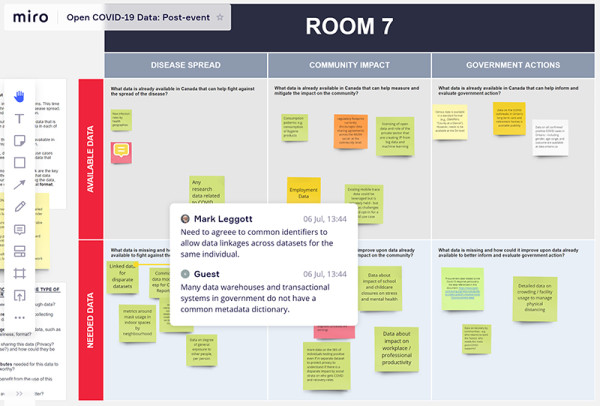
What is the role of data in the response and recovery from the COVID-19 pandemic? What datasets, data use cases, and data sharing practices should be promoted to scale our collective action?
On July 2nd, Open North and the Standards Council of Canada hosted a public consultation to discuss the role of data during the pandemic and how we can improve our practices to mitigate disease spread, understand the impact on our communities, and evaluate government actions.
With over 100 participants and five panelists engaging in discussions for an hour and a half, the event provided the platform for a much-needed conversation about how Canada can improve data release and sharing. As the keynote speaker, Mr. Anil Arora, said in his opening remarks, “data is a team sport.”
“Data is a team sport.”
– Mr. Anil Arora, Keynote speakers and Canada’s Chief Statistician
The consultation tested an innovative way of quickly engaging people online. Inspired by a call to action from the International Open Data Charter and Organization for Economic Cooperation Development’s Digital Government and Data Unit, Open North tried new collaboration and online engagement strategies, including an interactive whiteboard platform to consult the public.
This blog post provides a brief overview of the event, as well as some additional information for those interested in hosting their own online consultation. For key takeaways and more in-depth analysis from the consultation, see our Consultation Brief.
FIVE PANELISTS, FIVE PERSPECTIVES
Open North invited five panelists to introduce the discussion on data during the pandemic, providing a range of perspectives on health and data:
- Mr. Anil Arora, the Chief Statistician of Canada, spoke about the need for standards, interoperability, and collaboration, explaining Statistics Canada’s focus on ensuring that different government partners could collect and share reliable data in a timely manner.
- Ms. Bonnie Healy, Health Director at Blackfoot Confederacy, drew on the example of a personal family loss to COVID to explain how the exclusion of First Nations health systems as active players in the Canadian health care system perpetuated issues such as data unreliability, unequal access, and ultimately lead to worse health outcomes for Indigenous communities.
- Mr. Éric Martel, Head of the Performance, Analysis, and Evaluation Branch at the Integrated University Center for Health and Social Services, Montreal, raised the issue of data silos limiting effective data sharing in Quebec. He provided an example from the frontlines: health care workers and patients were being tested in nursing homes, but there was no way to cross-reference data to prevent outbreaks.
- Dr. Erin Strump, Associate Professor at McGill University, spoke about the need for data sharing, especially with the general public, as well as researchers who were looking into economic and social policy.
- Mark Leggott, Executive Director of Research Data Canada, had comments that emphasized the value of metadata and appropriate documentation to ensure data quality and support data users.
Hear our speakers’ full remarks here.
TALKING DATA: INVITING PARTICIPANT COLLABORATION
Open North split participants into ten breakout rooms to engage in small group discussions. In each breakout room, participants were asked to identify data that were either already available or were needed for decision-making in Canada. The conversation followed the call to action, structuring the conversation around these three themes: (1) disease spread (2) community impact, and (3) government action.
Participants noted their contributions on Miro, an online, collaborative, real-time whiteboard application (see image below). The Open North team created individual boards for each breakout room and a facilitator walked participants through the exercise.

COVID-19 DATA IN CANADA: OPPORTUNITIES AND CHALLENGES
In a short 30-minute session, the consultation yielded numerous contributions and kicked off compelling discussions. When identifying data sets, participants spoke about issues with existing data sets as well as why they desired additional data or data released that represent more localized areas.
“[We need] more data on the socio-economic status of individuals testing positive … to understand if there is a disparate impact”
– Participant during the small group discussions
Overall, Open North found that participants were frustrated with traditional barriers to accessing and using data more than with what data was available, though this was also a challenge. Open North’s three main findings are:
- Participants want more data opened up. There are still many datasets that stakeholders would like to access to answer pertinent questions about disease spread, community impact, and government action.
- There are still long-standing barriers to data use. Available data was not detailed enough for analysis and decision-making and it’s difficult to share data due to a lack of consistent collection and release methodologies between various governments and geographic regions.
- It’s confusing to access data. Participants sometimes learned that the data they sought was actually already available, but that they didn’t know where to look!
WHAT WE LEARNED FROM HOSTING AN ONLINE CONSULTATION
Open North’s biggest takeaway is that there is immense interest in consulting the public about data during the pandemic. Close to 300 people requested to register for our consultation, showing the desire for people to learn and share more about how data is being used in the context of the pandemic.
People also want space to share their own thoughts and opinions. After months of listening, people are very interested in talking to each other and engaging with decision-makers in new ways to improve Canada’s response and recovery efforts regarding COVID-19.
Finally, Open North learned that the challenge of “breaking the ice” is even more pronounced online. In an online atmosphere, participants can often mute their video and audio, making it difficult to have full engagement. Open North found that it’s best to have prepared facilitators to ensure discussion as well as lots of time to allow people to gradually open up and share their thoughts.
Open COVID-19 data: engaging Canadians on their data needs demonstrated the value of consultations in a time of crisis. Opening up COVID-19 data can help us build trust between the public and the government, take full advantage of the analytical tools available, and effectively plan and address the needs of Canadians throughout the pandemic.